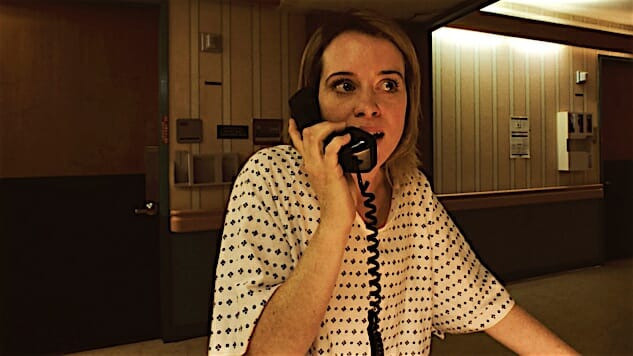Unsane

Sawyer knows she’s not crazy. In Unsane, she’s a young woman who’s recently moved from Boston to Pennsylvania, working an office job she doesn’t much like and enduring not-so-subtle sexual come-ons from her creepy boss who really thinks they ought to spend more time together. When she FaceTimes with her mother during her lunch break, she tries to put a positive spin on everything: Yes, I’m fine, I’m doing well, how are you? But even before she goes on a date that evening, taking the guy home but then having some sort of emotional breakdown before they can sleep together, there are signs that all is not well with her. Very soon, things will get much worse.
The new film from Steven Soderbergh—like his previous two, the kinky thriller Side Effects and the Southern-fried crime comedy Logan Lucky—is a capital-G genre flick, happily luxuriating in its own pulpy proclivities. But it’s also his strongest in a while, in part because its deceptively dashed-off tone is tied to a stronger thematic hook than he’s allowed in a while. And Unsane is guided by an expertly measured performance from Claire Foy as Sawyer, a woman who very much refuses to be pegged as hysterical, no matter how much the world wants to slap that straitjacket on her.
Shot on an iPhone 7 Plus and supplemented by drone cameras, this psychological thriller brandishes its slightly warped, fisheye-lensed aesthetic, plunging the viewer into a queasy, disorienting mindset from the start. (Soderbergh, who as per norm did his own cinematography, amplifies the sensation by placing the camera at uncomfortably high or low angles, as if we’re prying into intimate, uncomfortable moments we shouldn’t be seeing.) But Unsane is most upsetting for what it does to Sawyer.
After speaking with a therapist about the lingering emotional trauma that she’s carried with her from Boston—a needy, possibly unhinged man named David (Joshua Leonard) began stalking her, precipitating her departure—she finds herself being held against her will in a mental institution. (Apparently, she signed the wrong form, granting the facility permission to keep her under observation for 24 hours.) Sawyer insists it’s a misunderstanding—she’s not crazy—which only inspires nightmarishly blasé reactions from the clinic’s staff: Sure, right, you’re not crazy. Tell us another one.
Unsane plays on one of society’s most basic fears—being locked away and being disbelieved when we swear there’s been a mistake—and Soderbergh and screenwriters Jonathan Bernstein and James Greer heighten the anxiety by having Sawyer discover that her stalker is one of the facility’s nurses. But it couldn’t be him, right? He’s back in Boston. There’s no way he could know where she is, is there? Could David somehow be behind all this? Or is she, in fact, insane?
Soderbergh’s films have always exuded an icy remove, which isn’t to say that he doesn’t care about his characters or that he feels that his job is to be sure we care deeply about them. But not unlike another of his so-called “experimental” films, 2009’s micro-budget The Girlfriend Experience, Unsane wields its chilliness and unconventional aesthetic to amplify the stakes and make a larger point about the blunt cruelty and crushing soullessness of modern life. Sawyer is trapped in a hellish dilemma that Soderbergh exploits for maximum suspense, but the lurid B-movie pleasures are in service of saying something despairing about how women are marginalized, disbelieved, pushed to their breaking point and treated like they’re crazy.
-

-

-

-

-

-

-

-

-

-

-

-

-

-

-

-

-

-

-

-

-

-

-

-

-

-

-

-

-

-

-

-

-

-

-

-

-

-

-

-








































